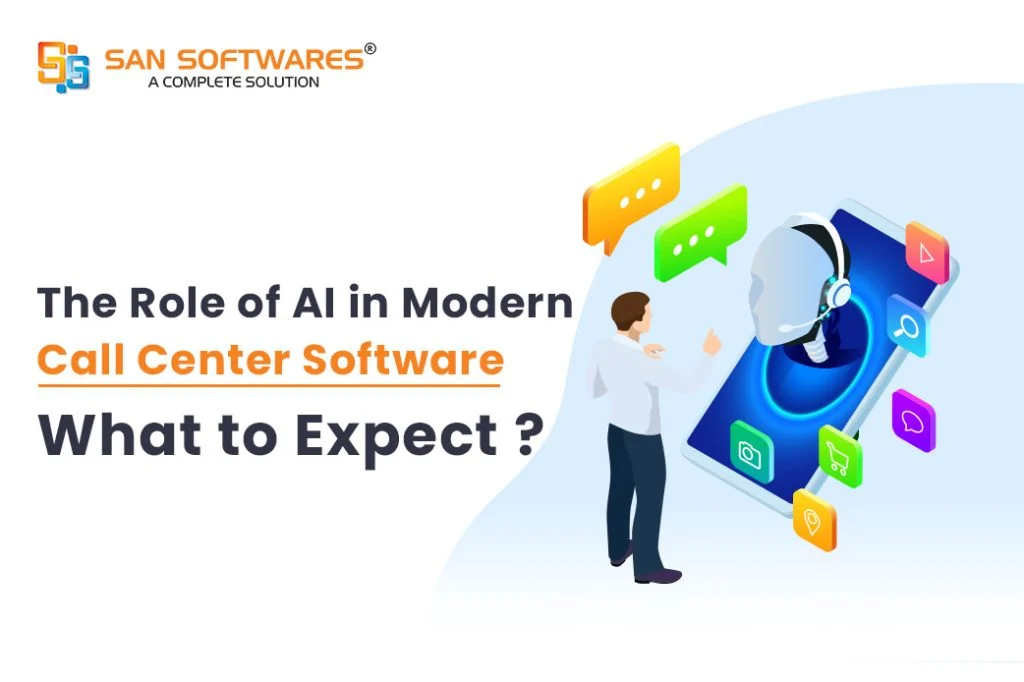
In the current dynamic business environment, call center services serve as a fundamental component of success for organizations globally. Every business seeks innovative ways to streamline operations, to deliver exceptional customer experience and feasible cost.Many companies are adapting AI (Artificial Intelligence) as their new game-changer, especially in call center services.
Artificial Intelligence (AI) is profoundly revolutionizing the landscape of modern call center solution, fundamentally changing the manner in which businesses manage customer interactions and amplifying operational efficiency.
Here’s what to expect from the fusion of AI into call center software and the role of AI in Calling Software for Call Center.
AI-powered call center solutions offer advanced customer support using virtual agents and chatbots. Hence, this system can handle quick responses and common queries, and route calls to a particular department, significantly improving customer satisfaction and reducing wait times.
Call center software possesses the capability to offer personalized services through the analysis of consumer data and prior interactions with artificial intelligence algorithms. This level of customization enables all agents to deliver pertinent responses, assess customer needs, and foster more robust relationships with clients.
AI optimizes all call routes by analyzing caller history, issue type, and language preference. It also ensures that each call is directed to the more suitable agents, improving resolution rates and reducing transfer times.
AI automates routine tasks like ticket generation, data entry, and follow-ups. Therefore, it allows human agents to focus on more complex problem-solving, while AI handles repetitive administrative work, streamlining the workflow.
AI forecasts call volumes, anticipates frequent problems, and allocates resources appropriately. By helping with workflow management, this predictive feature makes sure that call centers have the manpower and equipment necessary to manage critical times effectively.
AI-powered recognition software in call centers minimizes the use of keypad inputs by enabling natural language processing (NPL). This allows the customers to communicate, by just using spoken commands, creating a more user-friendly and seamless experience.
This software can understand, respond to, and interpret customer queries effectively, reducing the time spent navigating complex menus. This speech recognition helps to identify caller intent with a click of the hand., streamlining call routing and ensuring customers reach the suitable agent for better and faster solutions.
AI-powered software is a Cloud Based Call Center Solution that allows call recording and real-time monitoring and enhances quality controls and compliance in call centers. Managers can demonstrate best practices, provide training, and track progress by using call recordings of actual engagements with agents. Real-time call monitoring allows supervisors to oversee live conversations, ensuring that agents adhere to company protocols and standards.
This oversight maintains high service quality, boosts agents’ performance, and analyzes potential issues immediately. These characteristics foster a culture of ongoing development, guaranteeing reliable, protocol-compliant call center customer support.
AI-powered calling software for call centers can strengthen caller verification and identification processes. Biometric recognition and passcode verification to ensure that customer data is protected, and reduces the risk of fraud.
Call center AI will undergo significant changes in the future, including the development of increasingly complex AI agents that resemble humans and can comprehend and react to difficult conversations. To better understand complex inquiries, context, and tone, these AI bots will utilize cutting-edge machine learning and natural language processing technologies.
Customers will have a smooth experience that resembles human agents, hence, interactions that feel more genuine and sympathetic.
Businesses will be able to go from reactive to proactive client involvement with the help of future AI developments. All the call centers will be able to foresee client problems before they occur and provide customized solutions thanks to AI-driven predictive analytics.
For example, an agent or automated system may be prompted to provide the client with promotions or useful information if an AI system identifies possible unhappiness based on past encounters or purchasing patterns. By attending to client demands before they become more serious, this proactive strategy not only increases customer satisfaction but also fosters brand loyalty.
As AI technology develops further, Omnichannel Solution integration will become commonplace. As a result, call centers will be able to provide a constant quality of service across all channels of communication, such as chat apps, social media, emails, and phone calls.
Consumers will benefit from a cohesive experience where history and context are smoothly transferred between channels. This fusion guarantees that agents have access to comprehensive data and can engage with clients in an efficient manner, resulting in enhanced outcomes and heightened efficiency.
AI integration in call center solution and calling software for call center is reshaping the industry, offering enhanced customer interactions, efficiency, and security. As AI technology evolves, call centers can expect even more advanced tools to handle customers’ needs, which leads to a better understanding of problems, considerable delivery, and operational success.
SAN Softwares is a company dedicated to providing complete software solutions to Corporate and end-user customers.

SAN Softwares is a company dedicated to providing complete software solutions to Corporate and end-user customers.

© 2026 SAN Softwares Pvt Ltd | All Right Reserved
Enter your details to receive an OTP